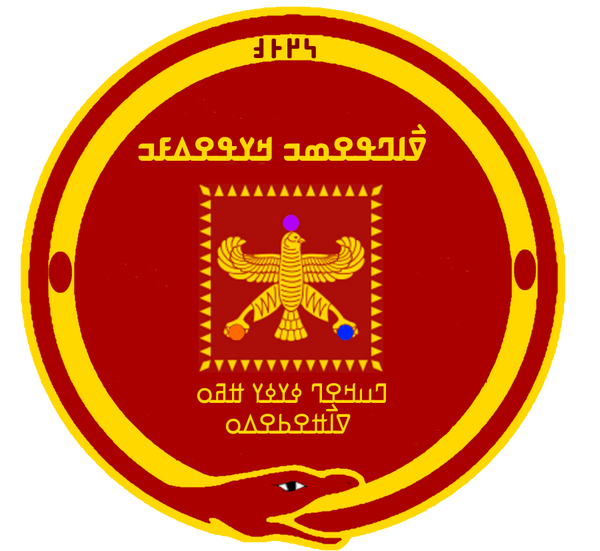
Fágbesisa of the Kpólí Fá
Share
Yorùbá people. The term is a morpheme made up of 𞤬𞤢𞥉 "Fá" plus 𞤩𞤫𞤧𞤭𞤧𞤢 "gbesisa"- incantatory speech. The term "gbesisa" or 𞤩𞤫𞤧𞤢 "gbesa" formed by elision means "the voice of effective speech". This is the mantra of sorts. It is the effective, active, activating and amazing speech of Fá. It’s an incantatory poem, a noema, a motto or a moral maxim.

From 𞤢𞤳𞤤𞤢𞥈𞤲 𞤼𞤵𞤤𞤢 Aklàn Tula (Okanran Òtúrá)
𞤾𞤭𞥇 𞤥𞤭𞥊𞥅𞤼𞤽𞤲 𞤤𞤹𞥇𞤹 𞤲𞤽𞥇 𞤸𞤽𞤲 𞤻𞤭𞥇𞤳𞤽 𞤼𞤮𞤱𞤫 𞤣'𞤢𞤴𞤭𞥇 𞤸𞤱𞤫𞤲𞤵 𞤫 𞤥𞤭𞥇 𞤥𞤢 𞤧𞤽𞥇 𞤣𞤫 𞤢𞤯𞥇 𞤫𞥊𞥅
Vǐ mǐtɔn lɛ́ɛ nɔ́ hɛn nyǐkɔ towe ɖ'ayǐ hwenu e mǐ ma sɔ́ ɖe ǎ é.
Our children preserve our name when we are gone.
From the 𞤮𞥊𞤮𞥊𞥅𞤤𞤭𞥊𞥅 𞤬𞤢𞥉 𞤩𞤫𞥊 𞤥𞤫𞥁𞤭𞥊 Kpólí Fá Gbè Mézì (Èjì Ogbè among the Yọrùbá).
In this Kpólí, 𞤬𞤢𞥉 𞤢𞤴𞤭𞥊𞤣𞤫𞥊𞤺𞤵𞥊𞥅𞤲 Fá Ayìdègún (Ọ̀rúnmìlà) told his 𞤬𞤢𞥉𞤾𞤭𞥊 Fávǐ (Fá students) that true success and dagbe (blessings... ìrè for the Yọrùbá) was through successfully securing a spouse and having children all under the guidance and approval of Fá.
His students were counting small material gains as signs of success which Fá Ayìdègún said were nothing in relation to the bigger picture - 𞤸𞤱𞤫 - hwe - family. This is yet another example of the emphasis on family in Afrikan culture, coming from the sacred literature itself.

From Dí Mézì:
𞤁𞤭𞥊𞥅𞤥𞤫𞥊𞥅𞥁𞤭𞥊 𞤱𞤮𞤣𞤭 𞥂𞤢. 𞤥𞤭 𞤳𞤢𞤲 𞤣𞤭𞥊𞥅𞤥𞤫𞥊𞥅𞥁𞤭𞥊⹁ 𞤥𞤢 𞤶𞤱𞤫 𞥂𞤢𞤳𞤮 𞤣𞤮 𞤥𞤭 𞤮𞥞 𞤂𞤵 𞤲𞤢𞤸𞤮 𞥂𞤢𞤳𞤮⹁ 𞤢𞥁𞤮𞤲 𞤲𞤢𞤸𞤮 𞥂𞤢𞤳𞤮⹁ 𞤳𞤱𞤹 𞤲𞤢𞤸𞤮 𞥂𞤢𞤳𞤮⹁ 𞤸𞤱𞤫𞥊 𞤥𞤢𞤸𞤮 𞥂𞤢𞤳𞤮. 𞤢𞤾𞤽 𞤣𞤭𞤲𞤣𞤭𞤲 𞤥𞤢 𞤴𞤭 𞤾𞤹 𞤵𞤲 𞤥𞤹. 𞥂𞤽 𞤲𞤽 𞤥𞤽 𞤱𞤭𞤤𞤭 𞤢𞤾𞤵𞤲 𞤣𞤮 𞤺𞤢𞤲𞤶𞤢 𞤥𞤹. 𞤼𞤽 𞥂𞤮 𞤣𞤫𞥊𞥅 𞤲𞤮𞤲 𞤣𞤢𞤫𞤢 𞤦𞤮 𞤲𞤮 𞤵𞤭 𞤩𞤢 𞤣𞤫𞥊𞥅𞤽 𞤢𞥇
Dímézì wodi kpa. Mi kan Dímézì, ma hwe kpako do mi o! Ku naho kpako, azon naho kpako, kwɛ naho kpako, hwè naho kpako. A vɔ dindin ma yi vɛ un mɛ. Kpɔ mɔ nɔ wili avun do ganja mɛ. Tɔ Kpo dé non dawa bo nɔ yi gba déɔ ã.
We have consulted Dímézì, that you do not close us in and crush us. Death, sickness, and trial cannot reach you; we do not enter a bush of thorns dressed in a large loincloth. The leopard does not catch the dog locked in a resistant metal cage. A riverbank cannot move to go to war on the opposite riverbank.

It is Yɛku Mɛji (Òyèkú Méjì) who is Mɛtɔlɔnfin's eldest
𞤦𞤽 𞤩𞤫 𞤥𞤹𞤶𞤭 𞤱𞤢 𞤶𞤹 𞤲𞤹𞤩𞤫𞥊𞥅 𞤼𞤽𞤲 𞤥𞤹𞤼𞤽𞤤𞤽𞤲𞤬𞤭𞤲 𞤱𞤢 𞤴𞤤𞤽 𞤴𞤫𞥇 𞤩𞤫𞤣𞤮𞥂𞤮
Bɔ Gbe Mɛji wa jɛ nɛgbé tɔn
Then Gbe Mɛji, the youngest
𞤃𞤹𞤼𞤽𞤤𞤽𞤲𞤬𞤭𞤲 𞤱𞤢 𞤴𞤤𞤽 𞤴𞤫𞥇 𞤦𞤫𞤣𞤮𞥂𞤮
Mɛtɔlɔnfin wa ylɔ yĕ gbeɖokpo
Mɛtɔlɔnfin called them one day
𞤫𞤫𞥊𞥅 𞤴𞤫𞥇 𞤣𞤮 𞤢𞤤𞤭 𞤶𞤹 𞤲𞤹𞤦𞤫𞥊𞥅 𞤼𞤽𞤲
Eé yĕ ɖo ali jɛ nɛgbé tɔn
They were on their way
𞤴𞤹𞤳𞤵 𞤥𞤹𞤶𞤭 𞤣𞤽 𞤲𞤵 𞤩𞤫 𞤥𞤹𞤶𞤭 𞤣𞤽 𞤲𞤭 𞥁𞤽𞤲
Yɛku-Mɛji ɖɔ nu Gbe-Mɛji ɖɔ ni zɔn
On the way Yɛku-Mɛji told Gbe-Mɛji to continue
𞤤𞤫 𞤥𞤭 𞤲𞤢 𞥁𞤫 𞤲𞤵𞤣𞤫 𞤣𞤮 𞥁𞤵𞤲𞤳𞤢𞤲 𞤥𞤹
Lé mi na ze nŭɖé ɖo zunkan mɛ
Under the guise that he was going to look for something in the bush (Gold)
𞤿𞤹𞤧𞤭 𞤱𞤹 𞥁𞤫 𞤫 𞤳𞤢 𞤣𞤭
Xɛsi wɛ zé é ka ɖi
he was afraid
𞤫𞥊𞥅 𞤱𞤢 𞤢𞥇 𞤳𞤢𞤳𞤢
É wa ă kaka
He stayed there for a long time
𞤦𞤽 𞤩𞤫 𞤹𞤹𞤶𞤭 𞤣𞤮𞥂𞤮 𞤩𞤮 𞤴𞤭
Bɔ Gbe-Mɛji ɖokpo gbɔ yi
At the point where Gbe-Mɛji went alone to Mɛtɔlɔnfin
𞤉 𞤦𞤤𞤮 𞤼𞤹𞤲𞥂𞤽𞤲 𞤲𞤭
È blo tɛnkpɔn ni
He was put to the test
𞤠𞤮 𞤤𞤹𞤩𞤢 𞥂𞤮 𞤸𞤵𞥊𞤲 𞤤𞤹 𞥂𞤮
Kpo Lɛgba kpo hùn lɛ kpo
With Lɛgba and the deities
𞤐𞤽 𞤫 𞤣𞤵 𞤣𞤫𞥊𞥅𞤶𞤭
Bɔ e ɖu déji
And he came out victorious
𞤉𞤫𞥊𞥅 𞤴𞤹𞤳𞤵 𞤥𞤹𞤶𞤭 𞤱𞤢 𞤫𞥊𞥅 𞤽
Eé yɛku-Mɛji wa é ɔ
As Yɛku-Mɛji arrived Gbe-Mɛji had already become chief
𞤼𞤭𞥊𞥅𞤲𞤥𞤹𞥇𞤹 Tínmɛ̀ὲ (interpretation)
Plain and simple, Yɛku-Mɛji lost her birthright to Gbe Meji because of fear.
 Fágbesisa Gùdáfliwɔgbe (Ògúndá Bèdé)
Fágbesisa Gùdáfliwɔgbe (Ògúndá Bèdé)
𞤀𞤱𞤢𞤴𞤢 𞤲𞤵 𞤥𞤢 𞤳𞤹 𞤿𞤽 𞤿𞤽 𞤣𞤮
Awaya nu ma kɛ xɔ xɔ do
You can't build a house on the ocean
𞤸𞤹𞤲 𞤲𞤢 𞤸𞤱𞤫 𞤦𞤽 𞤳𞤢𞤲 𞤲𞤢 𞤸𞤱𞤫
Hɛn na hwe bɔ kan na hwe
The building materials will be lacking
𞤧𞤭𞤲 𞤥𞤽𞤲𞤽 𞤲𞤹 𞤻𞤭 𞤣𞤮 𞤺𞤢𞤲𞤩𞤢𞤲𞤥𞤹
Sin mɔnɔ bɛ nyi ɖo
Water does not remain silent in a metal container
𞤼𞤵𞤲 𞤢𞤬𞤽 𞤲𞤵 𞤳𞤵𞤳𞤵 𞤲𞤵 𞤳𞤵𞤳𞤵 𞤶𞤭 𞤦𞤮 𞤣𞤽 𞤫𞤥𞤭 𞤼𞤹 𞤶𞤮𞤩𞤫
tun afɔ nu kuku ji bo ɖɔ emi tɛ jogbé
The scavenger tramples on a carrion and proclaims a Jogbe insurance
𞤿𞤮𞤥𞤹𞤧𞤭𞤲 𞤼𞤽 𞤦𞤽 𞤼𞤽 𞤩𞤢𞤲
Xomɛsin tɔ bɔ tɔ gban
In its anger, the river made detours
𞤿𞤮𞤥𞤹𞤧𞤭𞤲 𞤢𞤤𞤭 𞤦𞤽 𞤢𞤤𞤭 𞤦𞤢𞤲
Xomɛsin ali bɔ ali gban
In his anger, the road made detours
𞤀𞤤𞤢𞤣𞤢𞤸𞤱𞤭𞤧𞤮 𞤻𞤽 𞤣𞥉𞤹𞥂𞤹
Aladahwiso nyɔ ɖɛkpɛ
The sword of Alada despite its beauty
𞤄𞤮 𞤳𞤢 𞤩𞤢𞤲 𞤣𞤮 𞤦𞤹𞥇
Bo ka gban do bɛ́
Is crooked at the end
Many pertinent 𞤬𞤢𞥉𞤩𞤫𞤧𞤭𞤧𞤢 Fágbesisa ("ẹsẹ" or "verse" among the Yọrùbá) like these from the Afrikan Vodún tradition can be found in my book Kpólí Fá of Afrikan Vodun.
